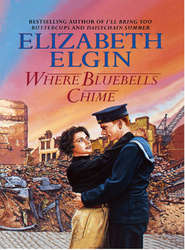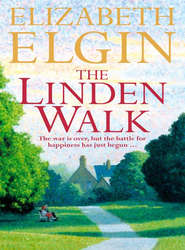По всем вопросам обращайтесь на: info@litportal.ru
(©) 2003-2024.
✖
Windflower Wedding
Автор
Год написания книги
2018
Настройки чтения
Размер шрифта
Высота строк
Поля
‘Hi,’ smiled Lyn, carefully pushing open the door, depositing tea and jam and bread on the chest of drawers. ‘I thought you’d be awake still. Brought you up a drink. Good leave, then?’
‘Great. And thanks for leaving the letters – and the welcome-back greeting.’
‘Keth all right?’ Lyn took off her jacket, eased off her shoes.
‘He’s fine. He still loves me, which isn’t a lot of use, him over there and me here. Any news? Scandal?’
‘News – yes. You know the buzz about the hats? Well, it’s official. New caps in clothing stores soon and we’re to swap the old ones for the new type. Not before time, either. Just like school hats, these things. The new ones will be a sort of cross between a matelot’s cap and a beret, I heard. Cheeky. Worn low on the forehead, an inch above the eyebrows. At least I’ll be able to wear my hair in a pleat and not have to screw it into a roll.’ Lyn Carmichael refused, unlike most other Wrens, to have her hair cut short. ‘Oh, and we needn’t carry our respirators everywhere now. Seems Hitler isn’t going to gas us! We’re only to take them when we go on leave. They’re going to let us carry shoulder bags. I’ve actually seen one, though we have to buy them ourselves. Fifteen bob, I think they’ll be. Quite smart. It’s all been happening whilst you were away.’
‘Things are looking up,’ Daisy smiled. ‘No more news?’
‘We-e-ll, yes.’ Lyn took a steadying gulp of tea. ‘I had a letter from Kenya. From my father. It took me ages to open it because for some stupid reason I hadn’t expected to hear from him again – well, not until the war was over. It seems, though, that he and Auntie Blod have written to each other regularly since my mother died.’
‘The lady you thought was your mother,’ Daisy corrected.
‘Thought. I never really liked her; that was why she had me sent to school in England, I suppose.’
‘But you like your Auntie Blod, don’t you?’
‘If you mean am I glad she’s my real mother and not my aunt, yes, I am. My father should have married her, though, knowing he’d got her pregnant.’
‘I think he might have done, Carmichael, if your Auntie Blod had told him.’
‘Then she should have and they could have married and I’d have had a proper mother and father!’
‘You’re still annoyed about it, aren’t you – annoyed with your father, I mean?’
‘Yes, I am. The randy old goat!’
‘Lyn! That isn’t kind! It must have been awful for your Auntie Blod, giving you up to her sister and thinking she would never see you again. And I think she still loves your father, else why did she never marry and why are they writing to each other all of a sudden?’
‘Why indeed, and me not being told about it! But I suppose it’ll all come out in the wash. Auntie Blod will tell me about it when I go on leave. And if she still loves him, well, what the heck!’
Blodwen Meredith, her real mother, if she wanted to be picky, must truly have loved her father, just as Lyn loved – would always love – Drew Sutton. It was like Auntie Blod once said: you couldn’t turn love off to order.
‘It’s their life,’ Daisy said softly.
‘Yes, it is. Want some bread and jam?’
‘Just tea, thanks. And, Lyn – about your father. You once said you liked him better than your mother; that he was quite decent to you, when she wasn’t there.’
‘I should think so, too! After all, I was his natural daughter. My mother must have hated it really, having me around. The one I thought was my mother,’ she amended, sighing.
‘Well, it’s all coming right for them now, and you should be glad about it if they want to get together after all those years.’
‘I suppose I should. I’ll try to be, if only for Auntie Blod’s sake. I love her a lot. Always did.’
‘Probably because some part of you knew she was your real mother.’
‘Probably. Sure you don’t want this bread and jam, Dwerryhouse?’
‘Sure. Eat it yourself, then get into bed. I’ve put a hot-water bottle in for you. Chop chop! Some of us want to get to sleep! And by the way – I missed you. I’m sort of glad to be back in the old routine.’
She pushed the empty mug beneath her bunk, then wriggled down into her blankets. Come to think of it, Liverpool wasn’t a bad old place to see out the war in, for all its faults – provided the Luftwaffe didn’t come back and blitz it again!
But anywhere would do really. Without Keth, one port was much the same as another. And Lyn was smashing to be with – when she wasn’t all quiet, thinking about Drew marrying someone else, that was. Poor Lyn …
‘Where are they, then?’ Tatiana Sutton smiled a greeting at Sparrow’s Joannie, who was quite high up, really, in the Women’s Voluntary Service.
‘You’re sure you don’t mind – taking on another one?’
‘Not at all. They aren’t a bit of trouble. It’s the one or two civilians who look at them as if they’ve got no right to be out in public that bother me!’
‘The air gunner is blind. Did Aunt Emily tell you?’
‘She did.’ Tatiana drew in her breath sharply. Tim had been an air gunner. ‘But he’ll like the music, even though he won’t be able to …’ Her voice trailed off, because it was awful enough having your face burned beyond recognition; to lose your sight as well must make you want to rage against the injustice of it.
‘The music will be an extra bonus,’ Joannie said. ‘Just going out on the town will be really something. It’s his first time out since – since it happened. You’ll have to play it by ear. You realize that, don’t you?’
‘I do. What’s his name?’
‘Bill Benson. How’s Aunt Emily, by the way?’
‘She’s fine. Sent her love. Joannie – just how old is she? I’ve asked, but she won’t tell.’
‘So have I and got one of her looks for it. But it’s my guess she’s nearer eighty than seventy.’
‘She’s a love. She bullies me, you know.’
‘I do know, but it’s really affection. She’s got to have someone to love. Here are the tickets.’ She handed over a re-used envelope, stuck down with an economy label. ‘They’re good seats. You’re to meet the chaps outside the theatre.’
‘The Adelphi, isn’t it? I’m looking forward to it. How are they to get back afterwards?’
‘There’ll be transport provided. There are quite a few lads out on the town tonight so wait with yours, can you, till a driver comes to pick them up?’
She said of course she would and that she knew which line to use on the Underground and where to get off. She was getting to be quite a Londoner.
‘One last thing, Tatiana. If there’s an alert, I think it would be best if you got them to the nearest Underground – then stay with them, till the all clear.’
‘I’ll look after them.’ There were fewer air raids on London since Hitler had invaded Russia. Very few people left a cinema when ‘Air-Raid Warning’ was flashed on the screen now. Usually it was only air-raid wardens, ambulance drivers and fire fighters who left to report to their nearest centre; just as Uncle Igor did. It was the same in the theatres. Someone – usually a pretty girl – stood at the side of the stage holding up a notice to the same effect.
But Londoners were getting blasé about the Luftwaffe. They had paid their money and were staying to see a show! It was as simple as that. And London was a big place, they usually reasoned; the bombs would probably drop miles away!
‘I’ll take them if they want to go,’ Tatiana smiled. ‘But best be off. Don’t want to keep the RAF waiting!’
She wouldn’t, she was to think afterwards, have been so eager had she known what would be there outside the Adelphi Theatre to greet her.
‘This is Bill,’ Sam said. ‘Sergeant Bill Benson.’ Which would have been all right, Tatiana thought when she had got the better of the cold, cruel pain that sliced through her, had he not turned, his hand searching for hers, and spoken to her with Tim’s soft way of speaking; had he not had a shock of fair hair like Tim’s, nor the wing of an air-gunner above his left tunic pocket.











